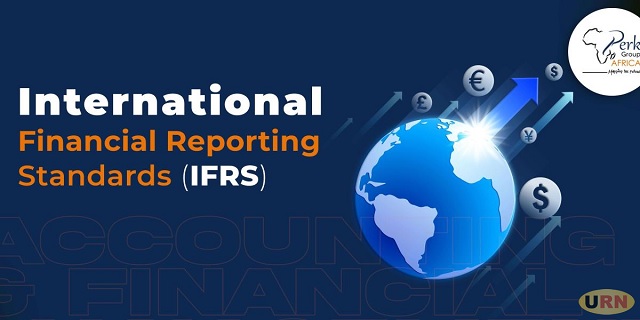
KAMPALA, UGANDA | THE INDEPENDENT | Entities operating in Uganda will have to adopt International Financial Reporting Standards (IFRS) in their reporting.
International Financial Reporting Standards (IFRS) consist of a set of accounting rules that determine how transactions and other accounting events should to be reported in financial statements.
The Institute of Certified Public Accountants of Uganda (ICPAU) recently adopted these standards in early September this year.
ICPAU Director Standards and Regulations, CPA Charles Lutimba said the move marked a significant shift in how businesses will report on their environmental, social, and governance (ESG) practices, setting a new dispensation for sustainability across the country.
According to Lutimba, the policy rationale for adopting the IFRS Sustainability Disclosure Standards in Uganda is to enhance the availability of reliable, comparable, and cost-effective information on sustainability-related risks and opportunities faced by organisations.
IFRS standards explained by CPA Charles Lutimbo
International Financial Reporting Standards (IFRS) will facilitate the use of complementary reporting frameworks, such as the Global Reporting Initiative (GRI), to address the information needs of various stakeholders, as may be permitted by the sustainability disclosure standards.
Furthermore, Lutimba notes that they will improve domestic entities’ access to foreign capital markets and encourage foreign direct investment, including access to green financing, and support the availability and flow of sustainability information throughout the supply chain.
Since the inception of the Financial Reporting (FiRe) Awards in 2011, the ICPAU’s focus has evolved from assessing compliance with IFRS Accounting Standards to integrating broader Environmental, Social, and Governance (ESG) aspects into corporate reporting.
Historically, companies have adhered to various frameworks such as the Global Reporting Initiative (GRI), the UN Sustainable Development Goals (SDGs), the Task Force on Climate-related Financial Disclosures (TCFD), the Integrated Reporting Framework among others.
However, this diversity made it challenging for economies to achieve comparability. To address this, the IFRS Foundation established the International Sustainability Standards Board (ISSB) to create a baseline framework for sustainability reporting.
The introduction of IFRS 1 and IFRS 2 marks the first significant step towards standardising sustainability related disclosures, focusing on integrated financial information and climate-related disclosures respectively.
Sustainability disclosure standards are essential for responsible resource management and mitigating future environmental and social risks.
They address critical issues such as climate related risks and opportunities. By implementing these standards, entities can improve the reliability and comparability of their sustainability information, making it easier for investors and other stakeholders to assess their practices.
Without these standards, future generations may face severe environmental and social challenges. Adopting these standards allows entities to offer clear, consistent, and cost-effective sustainability data, facilitating meaningful comparisons across different regions. For entities, adherence to sustainability disclosure standards offers several advantages.
It promotes full disclosure of material sustainability information, appealing to investors increasingly interested in responsible investments, thereby ensuring access to green funds and foreign capital markets.
Sustainability disclosure standards also address social equity and labor practices by promoting fair recruitment, compensation, staff welfare, and development.
The ISSB’s upcoming projects include a focus on human capital, emphasising the importance of diversity, inclusivity, and employee well-being.
Consumers can identify products adhering to sustainability standards through clear disclosure practices, packaging indicators, and company missions/ visions and values. Products from companies committed to sustainability are likely to attract more consumers, fostering brand loyalty and reducing environmental impact.
Consumers benefit from products that adhere to sustainability standards through healthier and more environmentally friendly options. Sustainable practices ensure the longevity of resources and contribute to a cleaner future.
Sustainability disclosure standards are built around core principles including, strategic alignment, governance, risk management and clear metrics and targets that enable measurement of an entity’s progress in relation to sustainability-related risks and opportunities. Effective implementation involves establishing governance structures, integrating sustainability into business strategy, managing sustainability risks, and setting measurable targets.
Sustainable practices help entities explore how they can interact with their stakeholders, society, the economy and the environment for the short, medium and long term resource efficiency.
Entities that fail to adopt sustainable practices may face market backlash and decreased consumer support. Entities may face challenges such as system changes, investment needs, and the development of new competencies to meet compliance with sustainable disclosure standards.
Despite these hurdles, the evolution of sustainability disclosure standards reflects the urgent need to address emerging environmental and social issues.
After the announcement to adopt IFRS Sustainability Disclosure Standards and the closure of the public consultations on the standards, ICPAU is now working towards appreciating and integrating responses from the public into the sustainable roadmap.
This initiative represents a significant step towards a more sustainable future for Uganda’s business landscape. The roadmap will be debated and validated at a date to be communicated. Interested parties are urged to look out for this date so that their views can help in shaping the desired roadmap for sustainability disclosure standards.
The roadmap will address key concerns, including, but not limited to, the entities required to apply the standards, mandatorily or voluntarily; the timeline for the standards’ implementation in Uganda; the nature and form of assurance for sustainability-related disclosures; ethical requirements for providers of sustainability information; and the location of the sustainable disclosures within entities’ annual report among others.
For more details on the new sustainability disclosure standards and the possible approach of the roadmap on sustainable disclosure standards for Uganda, stay tuned to ICPAU’s official channels.
*****
URN
 The Independent Uganda: You get the Truth we Pay the Price
The Independent Uganda: You get the Truth we Pay the Price



